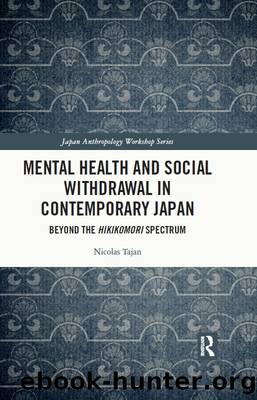Mental Health and Social Withdrawal in Contemporary Japan by Nicolas Tajan

Author:Nicolas Tajan [Tajan, Nicolas]
Language: eng
Format: epub
Tags: Psychology, General, Personality, Mental Health, Social Science, Regional Studies
ISBN: 9780815365747
Google: o1gMEAAAQBAJ
Barnesnoble:
Goodreads: 54502132
Publisher: Routledge
Published: 2021-01-04T03:12:59+00:00
Kaneko Sachiko (2006)
Much like Oginoâs work, Kaneko (2006) has contributed significantly to elucidating the hikikomori phenomenon. Kaneko studies the testimonies of those who have experienced hikikomori (hikikomori keikensha) and conducted an ethnographic survey of support groups. Her work first highlights the presence of a hikikomori industry (gyÅkai) â Internet forums, TV shows, articles, anime, manga, novels â with more than 100 support groups since 2002 (Kaneko 2006: 234), and which has increased significantly since then. According to her, when the Japanese are led to explain the causes of social withdrawal, answers are highly varied: not only education, new technologies, nuclearization of the family, amae, collectivism, changes in society but also staying at home for psychological and economic reasons, the fact that society allows it, etc. As this anthropologist asserts, saying that hikikomori comes from the middle class implies that this situation could potentially affect all Japanese families, because it is popular to self-identify as middle class in Japan. Under age 18, one speaks of futÅkÅ (school nonattendance) rather than hikikomori, and in accordance with what has already been highlighted by the Ministry of Health, Labor and Welfare (MHLW 2003), it is often the parents who seek help. Her field survey began in July 2003 and ended in July 2004: she regularly participated in the activities of a group, named by her âgroup Aâ and conducted research interviews with those who were engaged in the hikikomori industry. As part of her investigation of hikikomori autobiographies, she noticed that these writings are structured in the same way: before, during, and after the hikikomori period. The following excerpts of an interview with Mr. Suzuki illustrate this.
First, concerning the period prior to hikikomori up until primary school, Mr. Suzuki had experienced much emotional pain; he could not trust anyone, not even his parents who were always fighting with each other; he could not accept them as they were: âMy mother always complained to me about my father who had a short temper. Often, after dinner, I would listen to my motherâs complaints, and when doing so, I saw myself as playing the âsupporterâ role for my mother.â (Kaneko 2006: 237). So he suggested his mother to divorce his father, but she had a particularly traumatic answer for him: if she were to divorce, she would take his sister and leave him with his father. âI thought I had always hated my father, but it was after my father passed away that I became hikikomori. This happened when I was in my late twenties. I have never wanted to become an adult because I could not respect my parents. This was why I went to university so that I could delay becoming an adult for as long as possible.â (Kaneko 2006: 237). The story continues with the postgraduate period: âI had no choice but to start a full-time job. This was at a time when there were no such things as furÄ«tÄ. (â¦) I felt as if my life was over, and that I was going to hell.
Download
This site does not store any files on its server. We only index and link to content provided by other sites. Please contact the content providers to delete copyright contents if any and email us, we'll remove relevant links or contents immediately.
Through Windows of Opportunity : A Neuroaffective Approach to Child Psychotherapy by Marianne Bentzen; Susan Hart(964)
Overcoming ADHD Without Medication : A Guidebook for Parents and Teachers by Children and Natural Psychology Association for Youth; Children The Association for Youth(900)
Out of the Mainstream: Helping the Children of Parents with a Mental Illness by Loshak Rosemary;(893)
Delphi Collected Works of Sigmund Freud (Illustrated) by Sigmund Freud(657)
The Noom Mindset by Noom(595)
The 48 Laws of Mental Power: Overcoming Trauma and Building Mental Strength by Victor O. Carl(565)
The Psychology of Media and Politics by George Comstock & Erica Scharrer(485)
Sigmund Freud by Janet Sayers;(483)
MANIPULATION & MIND CONTROL: The Persuasion Collection: Dark Psychology Secrets, Analyze & Influence People with Nlp. How to learn Reading Friends and Develop Body Language Skills. by ROBERT TOWER(467)
It's nobody's fault: new hope and help for difficult children and their parents by Harold Koplewicz(451)
Totem and Taboo: Some Points of Agreement between the Mental Lives of Savages and Neurotics by Sigmund Freud(446)
Behold the Monster by Jillian Lauren(443)
The Hypnotic Coach: A Conversational Hypnotherapy Tool Kit by Marion Jess(423)
Directions in Technical Writing and Communication by Gould Jay R.;(413)
Mastering Flow: Perform Better, Experience More Joy, and Live a Happier Life by Nils Salzgeber(408)
THE PSYCHOLOGY OF ENTREPRENEURSHIP; New Perspectives by Michael M. Gielnik; Melissa S. Cardon; Michael Frese(391)
Positive Psychology Across the Lifespan; An Existential Perspective by Piers Worth(364)
The Modern Young Man's Guide to Manhood by Wayne Walker(360)
Mind Hacking Secrets and Unlimited Memory Power: 2 Books in 1: Learn How to Improve Your Memory & Develop Fast, Clear Thinking in 2 Weeks + 42 Brain Training Techniques & Memory Improvement Exercises by Sharp Scott(359)
